The Turks of Silicon Valley
- Written by Ayse Onal Z.
- Published in Professionals
By Written & Photos Ayşe Önal Zamboğlu
This email address is being protected from spambots. You need JavaScript enabled to view it.
San Fransisco- Oracle is one of the legendary firms of Silicon Valley. Despite the fact that it was formed thirty years ago, is has constantly renewed itself, managing to remain one of the very top firms for years on end. Boasting the sort of "company culture" that only established businesses have, Oracle is also known for placing importance on the welfare of its workers, for its beautiful campus, and for being successful in its field.
This email address is being protected from spambots. You need JavaScript enabled to view it.
San Fransisco- Oracle is one of the legendary firms of Silicon Valley. Despite the fact that it was formed thirty years ago, is has constantly renewed itself, managing to remain one of the very top firms for years on end. Boasting the sort of "company culture" that only established businesses have, Oracle is also known for placing importance on the welfare of its workers, for its beautiful campus, and for being successful in its field.
It is a company at which every engineer would like to work. Like all popular Silicon Valley companies, Oracle's general headquarters has a number of Turks working for it. We met with these eight Turkish employees of Oracle at lunchtime, and tried together to find answers to the many questions we had tucked away in our minds.
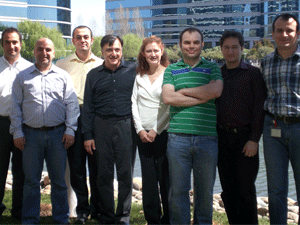
Turks of Oracle.
Do you plan on returning to Turkey? What are the first reasons that come to mind in terms of either staying here, or returning to Turkey?
Cihangir Aba- My wife and I talk about this constantly; if we do decide to return, it might not be to Turkey at first, but to a European country. The most basic reason is because of our parents.
Gürşat Olgun- In the short term, no. But speaking in the long term, yes.
Zeynep Erengil Yürek- That question is always in the back of my mind. I don't know when and how I will return, so I guess for right now, I'm putting off answering that question. My biggest reason for wanting to return is my family and friends.
Baki Yaşar: I am not planning on returning to Turkey for at least the next five years.
Tuğrul Bingöl- We are planning on returning to Turkey. The most important reason for us is that we want to spend more time with our families. The fact that we love Turkey and that we want our children (even though we don't have children yet) to live for at least some time in Turkey are other reasons.
Kaan Baloğlu- If Turkey's socio-political and economic risk profile changes in a positive direction, and if I can find a position which would allow me to use my education and the professionsal skills I have acquired, I will return.
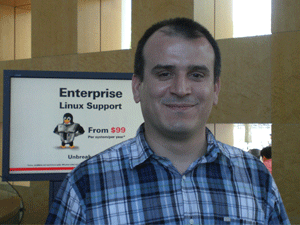
Gursat Olgun.
Would you be able to do the work that you do here in Turkey? Would you be able to attain professional satisfaction?
Tolga Yürek - My work here is with the development of software programming. We are involved in the development of cluster technology, the world's most widespread and powerful database product. I think you could really only do global level work like this in Silicon Valley.
Cihangir Aba - My work is not directly related to programming; I am working in the presentation and localizing of new products to EMEA. I left Oracle Turkey at the start of 2003. At that time, there was almost no one doing regional work from the Istanbul offices. But now the situation is very different; there are many people doing regional work, so the business has become more "showy."
Baki Yaşar - I generally work one or two weeks a year from the Oracle Ankara offices in order to be able to extend my stay in Turkey. The work atmposphere at the Oracle Turkey offices is very different, and interpersonal relations are much closer. I think it could be satisfying in terms of professional needs, but perhaps following new developments is easier from Silicon Valley.
Gürşat Olgun - I could not do the same work in Turkey that I am doing here now. I don't think that I would be professionally satisfied.
Zeynep Erengil Yürek - Yes, the work I do here I could do in Turkey, and I think it would offer me satisfaction. This might not be the case for many positions in Silicon Valley in general, but product management is a very flexible and less technical area. So even if it weren't exactly the same job or the same range of products I was dealing with, I think I could find exciting products and work in Turkey.
Kaan Baloğlu - There is no software product the size of the Oracle Database being developed right now in Turkey. From what I have heard from my friends working in the computer industry in Turkey, I don't believe I would be professionally satisfied there.
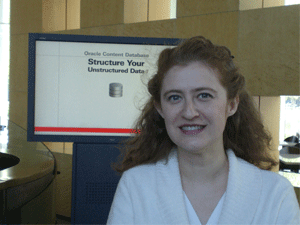
Zeynep Erengil Yurek.
Tuğrul Bingöl - Right now, I am among a handful of people involved in developing the Oracle database. The product we have been working on is number one in terms of global use, and just knowing that it is used by millions and for the benefit of millions is satisfying. My last job in Turkey was working at the Kocbank Information Processing Center in 1998. At that time, it really wasn't possible for people with computer engineering degrees to work in any jobs outside of IT related positions. There weren't really any research and development positions open. But I think the situation is different now in Turkey, so I'd have a hard time answering your question.
What do you think the possibility is that a world-level technology firm from Turkey which was like Oracle could emerge in the future?
Zeynep Erengil Yürek - I doubt that I would see this in my lifetime.
Baki Yaşar - From the perspective of operational and management capacity I believe it would be possible. But it would be difficult to create a software giant like Oracle in terms of the pre-existing programming base and human resources in Turkey. Maybe a model based on the kind of Indian outsourcing type, in terms of a software programming and service model, would be more realistic for Turkey.
Cihangir Aba – I think there is zero chance of a company like Oracle coming out of Turkey. In all of Europe even, there is only SAP which is near the level of Oracle; but from here on in, there is zero chance that a company of this size is going to emerge. Oracle's turnover is higher that Koc Holding's. But if your question is whether a successful software programming company might emerge, that's a different question. I don't know how chronic problems in Turkey, like the deficit in terms of capital money, or the narrowness of the software market, would be overcome.
Gürşat Olgun – I say "inshallah" such a company will emerge.
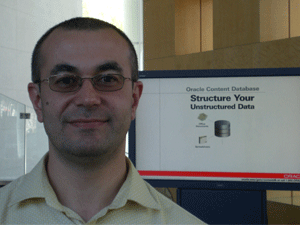
Baki Yasar.
Tolga Yürek - In order to be on a "global level," a company needs to have years and years of experience, and to have been one of the first to have entered the world market. But if someone thinks of an area that hasn't been thought of before, or finds a new angle in the sector, such a company could emerge. But we are talking about brain competition here. Silicon Valley does not only represent America. It is a spot where bright engineers from all over the world come together. So any firm trying to rise in this sector in Turkey would have to be careful not to miss out on our brightest young graduates in Turkey.
Kaan Baloğlu – For as long as the brain drain into American continues and for as long as our universities are not able to obtain the standards of American universities, I do not see such a thing as being possible.
Tuğrul Bingöl - In order for companies like Oracle to be able to emerge in Turkey, Turkey needs to produce well-trained graduates from its universities, it needs to place importance on research and development subjects, and it needs investors who are able to make investments in the area of technology. As you know, investing in research and development is very risky. There are many investors in Turkey who might not want to take this risk. Aside from this, students at school have to be filled a bit more with enterprising spirit. I hope that in the near future they do come into place, and that world-level technology companies start to emerge from Turkey.
All right, well, do any of you plan on setting up your own companies? Do you ever think of returning to Turkey and starting your own businesses?
Kaan Baloğlu - If I believed I could settle on the right plan, and put together the right team of people, yes. But at this point, before setting up my own company, I think it's important that I work in a global company and gain experience. On the subject of setting up a company in Turkey, the legal and financial infrastructure is not as developed in Turkey as it is in the U.S. Unlike in the U.S., there aren't any companies in Turkey which can offer venture capital to enterprising people who want to set up their own businesses in Turkey, and besides, there are lots of bureaucratic difficulties. I would consider it, though, if these areas saw some improvement during the EU accession process.
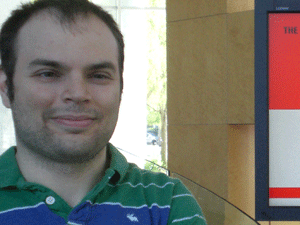
Kaan Baloglu.
Cihangir Aba - In terms of dreams, yes. But if we are talking about concrete plans, no. The real problem is just thinking about finding the courage to set up one's own firm. Whether it is in America or Turkey is just a detail.
Baki Yaşar - For the past four years, I have been taking annual trips to Oracle India to visit the employees there. And within these four years, I have witnessed an incredible leap in the Indian software programming and model sector. As I've watched this, I've asked myself why I wouldn't be able to set up a similar "outsourcing" model program in Turkey. What has occured to me is to use the Indian model, and offer IT services in an "outsourcing" manner from Turkey to companies in Europe. But the biggest barrier to this is that computer and information sector prices are extremely high in Turkey as compared to India.
Gürşat Olgun – I think this is an idea that every engineer has, but timing is very important. I would very much like to set up my own company in Turkey, but there are too many details that I would have to take care of first.
Zeynep Erengil Yürek – Currently I have no such plans.
What do you think about the technoparks in Turkey?
Çetin Özbütün - Though they present an attractive idea at first, the reason that global technology firms like Oracle are not able to really use these technoparks is that there aren't enough computer engineers in Turkey. When you look at the number of people graduating with computer engineering degrees in Turkey every year, the current needs are very difficult to meet. Since there is no inactive capacity right now, it can't be expected that foreign firms will rush to Turkish technoparks to take advantage of the tax breaks.
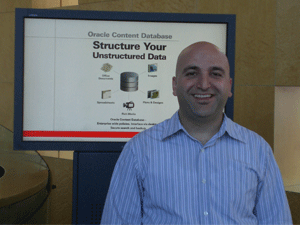
Tugrul Bingol.
Cihangir Aba - As far as I can see from here, there are good enterprises being attempted right now in Turkey, but I will say the same thing again that I have said before: there is a lack of venture capital, as well as the lack of a ripe market.
Tolga Yürek - A friend of mine returned to Turkey and set up a technology company. I think their company is in a technopark, and they are quite pleased with the situation.
Baki Yaşar - I have seen the techopark on the ODTU campus. It looks good, but right now, there aren't enough of these technoparks. There could be technoparks set up in every city where there is a university, near the university.
A question for those of you who have worked before in Turkey: what are some of the positive and negative differences you observe between the work culture in Turkey and the US?
Tuğrul Bingöl - Here the work culture is generally very free. No one really looks at what times you come or leave; what is important is what you have achieved. In addition, there is an incredible level of respect for your private life. As far as I am concerned, these are advantages. On the other hand, the work atmosphere in Turkey is much warmer; you feel like you are literally working in a family atmosphere. My work collegues in Turkey are also good friends outside the workplace. I think these are extras which stem from our culture.
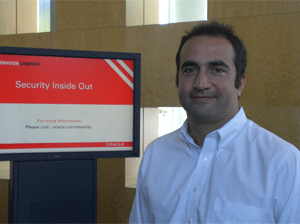
Cihangir Aba.
Zeynep Erengil Yürek - One of the main differences I have experienced is in terms of work times and location in Silicon Valley. Here, as long as you don't miss meetings, you are readily reachable, and you finish your work on time, it really doesn't matter where and for which hours you work. Actually, one effect this has is to rub out the distinct borders between your work and private lives, but if you organize it correctly, it can work very well. A second difference is that employees here take more initiatives on their own, and that differences in opinion can be debated comfortably. Last of all, I would like to touch on how teamwork is more successful in Turkey.
Cihangir Aba – I think it's hard to generalize on "work culture," but I think that in Turkey there is a wider variety of work atmospheres, and I think working rules and habits are changing quickly.
Tolga Yürek - I worked for almost a year in a bank's information processing center in Turkey. My impression was that the people there were very tied to their official work hours. Here, though, no one pays attention to what time you come and what time you go. But there is no such thing as overtime either. For software programmers, I think this work culture is preferable.
To everyone: I want to thank you for taking time out for Turks of America. We are now, with your help, presenting our second article on Turks working in Silicon Valley. With wishes that we will be able to come forward with many more great articles like this, I thank you all very much.
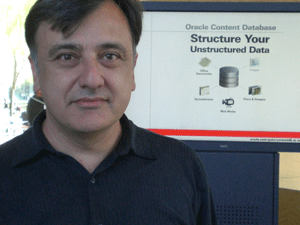
Cetin Ozbutun.
WHO ARE THEY?
Çetin Özbütün - After graduating from Hacettepe University's Computer Information Department, he received a master's from Brown University in the same field. He has been working at Oracle now for 18 years. For six years, he was a software engineer for Oracle's main product, the database, and for the past 12 years he has been involved in directing research and development for the Oracle database. His title is Vice President of Database Data Warehousing Technologies.
Tuğrul Bingöl – After graduating in 1995 from Hacettepe Univesity's Computer Information and Engineering Department, he worked for 3 years at Kocbank's information processing center. In 1998, he came to the US to get a higher degree in computer information processing at the Rensselaer Polytechnic Institute. In 2000, he graduated with his advanced degree, and worked for two years at Silicon Graphics. He has been working since 2002 at Oracle.
Cihangir Aba - After graduating from Bosphorus University's Industrial Engineering Department, he worked at Arcelik, Corotech, and Oracle Turkey. He came to America in 2003, and works in Oracle's E-Business Suite in the developement, presentation and localization of Oracle E-Business Suite products to the EMEA market.
Gürşat Olgun - He graduated from Bilkent University, and then received his master's from Stanford University. His real specialization area is electrical engineering, but currently he is a computer engineer. He has been working at Oracle for ten years .
Zeynep Erengil Yürek -She graduated from Anadolu High School, Bosphorus University's Computer Engineering Department, and has a Bosphorus University MBA. She worked for 5 years at Yapi Kredi Bank's software development program. For the past six years, she has been working at Oracle in Product Management.
Tolga Yürek - After graduating from Bosphorus University's Computer Engineering Department, he received his master's in the same subject from the University of California at Santa Barbara. He has been working at Oracle now for ten years, in the Server Technologies department, and as a software developer in Oracle's RAC group.
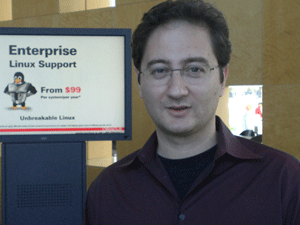
Tolga Yurek.
Baki Yaşar - A graduate of Anadolu University in the Electronic Engineering program, he arrived in America in 1994 where he went to the University of Texas at Arlington to get his master's in Information Systems. He started working nine years ago for Oracle as an IT Analyst, and right now is the director of the IT group.
Kaan Baloğlu - He graduated from Bosphorus University's Computer Engineering program. After receiving a master's in the same field from Stanford University, he joined Oracle. He has been working for 2 years now at Oracle's Data Storage Engine.
(March 2007, 24th Issue)
Last modified onSaturday, 06 May 2017 10:07
Tagged under








